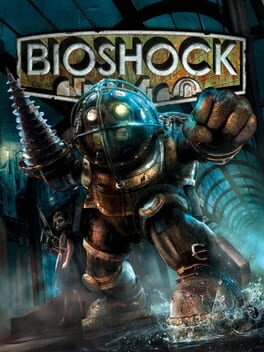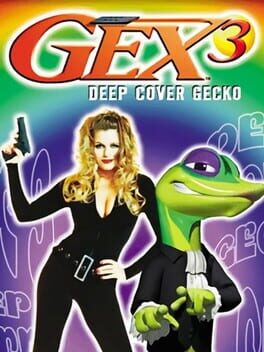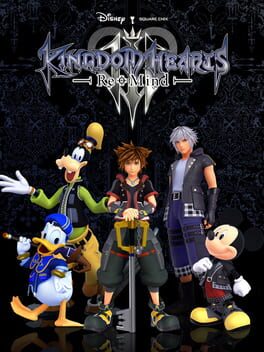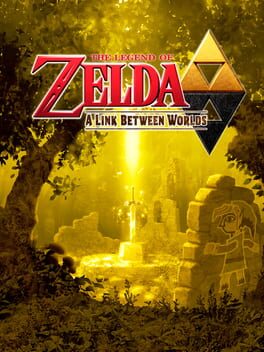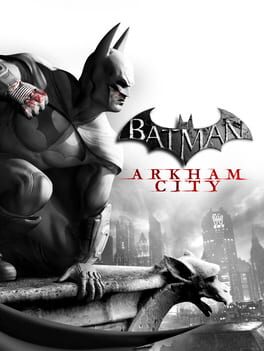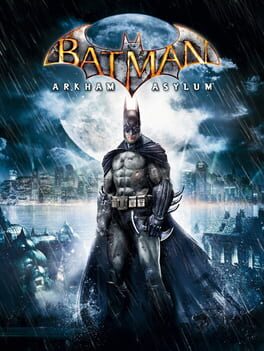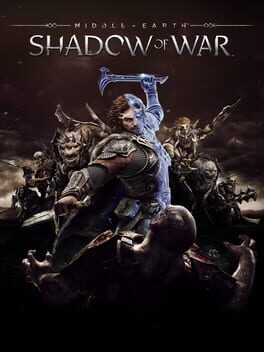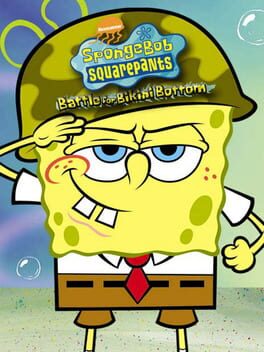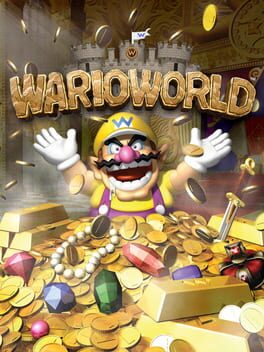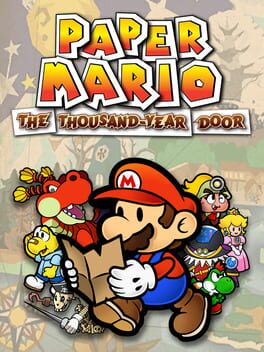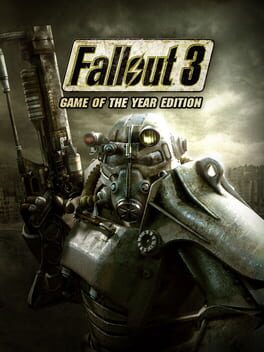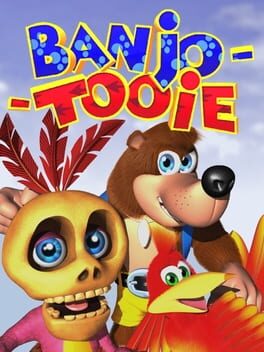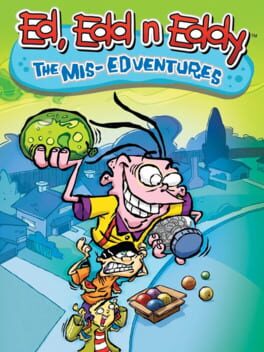RandomContent
2007
The level design in this game is fantastic, everything else in the game isn't.
The Level Design:
Gex 3 seriously has some of the best levels of any 3D platformer I've ever played. No two main levels have the same theme, even the hub worlds and some of the side levels are unique. Every main level feels big and sprawling, big enough to be impressive and give a sense of accomplishment for making it to the end, but linear enough so that the player doesn't get lost. Each level is loaded with background gags, unique enemies, and objectives that are well-separated enough to cut back on backtracking when going for different remotes(most of the time). Gex's unique costumes and quips for each level are a nice touch too. I can run through most of the levels in this game a thousand times and never get tired of them.
The Everything Else:
This game's story was likely the inspiration for Sonic 06. I find it hilarious that this random woman who never appeared in the previous games is suddenly the driving force behind the plot, and not hilarious in the way the game intended. The soundtrack is pretty good and Gex's quips are occasionally funny, but if you feel the need to throw your TV out a window by the end of the story after hearing Gex's 15th flirty conversation with a human playboy model, I won't blame you. The actual gameplay can be pretty stale and repetitive, and the 100 fly coin objective in each level would probably ruin the game for me were the levels not so good. The boss fights are joke(Rez excluded) and most of the collectables are worthless, only feeding into a lame 100% completion reward that is not worth your time. The main villain never has a speaking line in the whole game, making Gex 3's connection to the previous 2 games feel tenuous; this game has the Sly Cooper 3 problem. This game is unpolished and lackluster in many ways.
Altogether, I loved this game for the level design alone. If great levels themselves are enough to spark your interest, Gex 3 will scratch that itch. If that isn't enough for you, then I'm sad to say this is a game to skip.
The Level Design:
Gex 3 seriously has some of the best levels of any 3D platformer I've ever played. No two main levels have the same theme, even the hub worlds and some of the side levels are unique. Every main level feels big and sprawling, big enough to be impressive and give a sense of accomplishment for making it to the end, but linear enough so that the player doesn't get lost. Each level is loaded with background gags, unique enemies, and objectives that are well-separated enough to cut back on backtracking when going for different remotes(most of the time). Gex's unique costumes and quips for each level are a nice touch too. I can run through most of the levels in this game a thousand times and never get tired of them.
The Everything Else:
This game's story was likely the inspiration for Sonic 06. I find it hilarious that this random woman who never appeared in the previous games is suddenly the driving force behind the plot, and not hilarious in the way the game intended. The soundtrack is pretty good and Gex's quips are occasionally funny, but if you feel the need to throw your TV out a window by the end of the story after hearing Gex's 15th flirty conversation with a human playboy model, I won't blame you. The actual gameplay can be pretty stale and repetitive, and the 100 fly coin objective in each level would probably ruin the game for me were the levels not so good. The boss fights are joke(Rez excluded) and most of the collectables are worthless, only feeding into a lame 100% completion reward that is not worth your time. The main villain never has a speaking line in the whole game, making Gex 3's connection to the previous 2 games feel tenuous; this game has the Sly Cooper 3 problem. This game is unpolished and lackluster in many ways.
Altogether, I loved this game for the level design alone. If great levels themselves are enough to spark your interest, Gex 3 will scratch that itch. If that isn't enough for you, then I'm sad to say this is a game to skip.
The average of two scores:
ReMind: 2/10
Worst piece of sit DLC I ever wasted money on. I had to pay $30 just to play the main game again and re-watch a ton of cutscenes with the only added feature being the option to play as a much weaker character? It's amazing how much this DLC learns nothing from the flaws of the main game and provides debatably the worst experience in KH history. This is an outrage!
Limit Cut: 10/10
Holy sit, best boss roster in years. Each boss is challenging, distinct, loaded with great music and unique mechanics. Limit Cut offers 12 of the best bosses in KH history(Dark Riku is there too), and it doesn't stop there. I never thought Lingering Will would be topped in terms of difficulty, but I haven't beaten Yozora to this day. Be that as it may, I never found myself frustrated. This boss roster must be experienced!
Overall: 6/10
You know ReMind is bad if having one of the greatest boss collections in gaming history waiting for you at the end just barely justified the purchase. I would have much preferred it if ReMind was removed or at least shortened and the price was dropped down to at most $20, but I'll take Limit Cut however I can get it. If you buy this DLC, please don't stop playing until you finish ReMind, it will be worth it.
ReMind: 2/10
Worst piece of sit DLC I ever wasted money on. I had to pay $30 just to play the main game again and re-watch a ton of cutscenes with the only added feature being the option to play as a much weaker character? It's amazing how much this DLC learns nothing from the flaws of the main game and provides debatably the worst experience in KH history. This is an outrage!
Limit Cut: 10/10
Holy sit, best boss roster in years. Each boss is challenging, distinct, loaded with great music and unique mechanics. Limit Cut offers 12 of the best bosses in KH history(Dark Riku is there too), and it doesn't stop there. I never thought Lingering Will would be topped in terms of difficulty, but I haven't beaten Yozora to this day. Be that as it may, I never found myself frustrated. This boss roster must be experienced!
Overall: 6/10
You know ReMind is bad if having one of the greatest boss collections in gaming history waiting for you at the end just barely justified the purchase. I would have much preferred it if ReMind was removed or at least shortened and the price was dropped down to at most $20, but I'll take Limit Cut however I can get it. If you buy this DLC, please don't stop playing until you finish ReMind, it will be worth it.
Link Between worlds is carried by its gameplay.
Plenty of other Zelda games have told much more interesting stories, had much more memorable characters, and showcased better soundtracks and designs. Maybe it's just me, but I didn't care for how many of the characters in LBW looked. I also felt that too many plot-crucial moments and character revelations were crammed into the final few minutes of the game, and they felt very rushed and not nearly as compelling as they could have been.
All that said, the game is still worth playing. The sense of freedom the game gives is refreshing, and the item purchase system is a brilliant way to slowly introduce players to new items without overwhelming them, and still punishing them for death. The game can provide more of a challenge than most other Zelda games I've played, and the wide variety of monsters, dungeons, and collectables is a treat made even better by the freedom to tackle dungeons in whatever order you please.
The underdeveloped characters and rushed story do hold LBW back from being one of the great Zelda games in my opinion. But, even though the Link between story and gameplay wasn't as strong as I'd have liked, A Link Between Worlds is still well worth your time for the gameplay alone.
Plenty of other Zelda games have told much more interesting stories, had much more memorable characters, and showcased better soundtracks and designs. Maybe it's just me, but I didn't care for how many of the characters in LBW looked. I also felt that too many plot-crucial moments and character revelations were crammed into the final few minutes of the game, and they felt very rushed and not nearly as compelling as they could have been.
All that said, the game is still worth playing. The sense of freedom the game gives is refreshing, and the item purchase system is a brilliant way to slowly introduce players to new items without overwhelming them, and still punishing them for death. The game can provide more of a challenge than most other Zelda games I've played, and the wide variety of monsters, dungeons, and collectables is a treat made even better by the freedom to tackle dungeons in whatever order you please.
The underdeveloped characters and rushed story do hold LBW back from being one of the great Zelda games in my opinion. But, even though the Link between story and gameplay wasn't as strong as I'd have liked, A Link Between Worlds is still well worth your time for the gameplay alone.
2011
The magnum opus of the 3D superhero game.
Succinctly conveying everything worth loving about the caped crusader's night in Arkham City may very well be beyond this review's skill. From Arkham City's exciting opening to its chilling end, the game provided varied gameplay, meaningful side quests, and memorable characters all supported by one of the best stories ever told about Batman. The improved presentation, new gameplay mechanics, and fantastic boss fights made the flaws of the previous game feel like distant memories. So many of Batman's iconic characters make appearances without ever feeling forced redundant. Collecting Riddler trophies is satisfying, the side quests often rival the main quest in urgency, and the gameplay is so strong that the combat/stealth side modes can provide hours of senseless fun.
It was hard for me to convey everything great about this game, I just adored it. Ten years later, and it has aged like a fine wine. I don't think we will ever have a better superhero game.
Succinctly conveying everything worth loving about the caped crusader's night in Arkham City may very well be beyond this review's skill. From Arkham City's exciting opening to its chilling end, the game provided varied gameplay, meaningful side quests, and memorable characters all supported by one of the best stories ever told about Batman. The improved presentation, new gameplay mechanics, and fantastic boss fights made the flaws of the previous game feel like distant memories. So many of Batman's iconic characters make appearances without ever feeling forced redundant. Collecting Riddler trophies is satisfying, the side quests often rival the main quest in urgency, and the gameplay is so strong that the combat/stealth side modes can provide hours of senseless fun.
It was hard for me to convey everything great about this game, I just adored it. Ten years later, and it has aged like a fine wine. I don't think we will ever have a better superhero game.
The game that revolutionized the 3D superhero experience.
In 2009, the charm and aesthetic from the beloved animated series came to home consoles and took gamers by storm, creating an experience that was varied, atmospheric, and just damn fun. The unforgettable events of Batman's trek through the cursed asylum saw him bouncing between fun combat and pulse-pounding stealth. Unraveling the mysteries of Arkham, confronting Batman's rogues gallery, and saving Gotham is an enthralling experience worth having to this day.
Though I'd love to say this game remained the greatest of its contemporaries, some aspects of the game do feel basic and unpolished. I didn't care for many of the character designs(almost anyone other than Joker or Batman), and the NPCs can look dreadful in motion. While the stealth and combat are fun, they can feel rather basic without the variations brought by later games in the series. Lastly... the boss fights suck. Just about every single boss in the game relies heavily on grunt enemies and repetitive mechanics, some of them have good presence and aesthetics, none of them are enjoyable from a gameplay standpoint. Mr. Freeze and Deathstroke would not join us for some time. However, while the initial experience may have been flawed, it was well worth the time.
From Spiderman to Middle-Earth, so many games owe respects to Arkham Asylum to this day, the landscape simply would not be the same without it. While it is a cliché to say this game makes you feel like Batman, it is a cliché for a reason, and it is hardly a bad thing.
In 2009, the charm and aesthetic from the beloved animated series came to home consoles and took gamers by storm, creating an experience that was varied, atmospheric, and just damn fun. The unforgettable events of Batman's trek through the cursed asylum saw him bouncing between fun combat and pulse-pounding stealth. Unraveling the mysteries of Arkham, confronting Batman's rogues gallery, and saving Gotham is an enthralling experience worth having to this day.
Though I'd love to say this game remained the greatest of its contemporaries, some aspects of the game do feel basic and unpolished. I didn't care for many of the character designs(almost anyone other than Joker or Batman), and the NPCs can look dreadful in motion. While the stealth and combat are fun, they can feel rather basic without the variations brought by later games in the series. Lastly... the boss fights suck. Just about every single boss in the game relies heavily on grunt enemies and repetitive mechanics, some of them have good presence and aesthetics, none of them are enjoyable from a gameplay standpoint. Mr. Freeze and Deathstroke would not join us for some time. However, while the initial experience may have been flawed, it was well worth the time.
From Spiderman to Middle-Earth, so many games owe respects to Arkham Asylum to this day, the landscape simply would not be the same without it. While it is a cliché to say this game makes you feel like Batman, it is a cliché for a reason, and it is hardly a bad thing.
2003
Video Game junk food: brief, unsubstantial, and satisfying in the moment.
I wouldn't claim bashing large droves of enemies as the garlic-loving glutton isn't fun for a time, but the combat is so simplistic and unvaried that it manages to wear out its welcome before the end of Wario World's short campaign. The collectibles can be satisfying to earn, but there are far too many of them, and they serve as little more than fleeting dopamine cookies in the long run. Still, I have to recommend going for 100% in this game, because you'll be done in about an hour otherwise.
Buy the game cheap and take it for what it's worth, you'll have a good time, a short time, but a good one.
I wouldn't claim bashing large droves of enemies as the garlic-loving glutton isn't fun for a time, but the combat is so simplistic and unvaried that it manages to wear out its welcome before the end of Wario World's short campaign. The collectibles can be satisfying to earn, but there are far too many of them, and they serve as little more than fleeting dopamine cookies in the long run. Still, I have to recommend going for 100% in this game, because you'll be done in about an hour otherwise.
Buy the game cheap and take it for what it's worth, you'll have a good time, a short time, but a good one.
A unique, enduring classic which deserves every bit of the love it gets.
In Thousand-Year Door, you don the red, 2-dimensional hat of Mario as you explore some of the most distinct, unconventional and fleshed-out worlds ever brought to life in a Nintendo game. While it is true that other Mario games may have this one beat in terms of inventive gameplay mechanics, this one succeeds at creating worlds that feel inhabited, characters with meaningful issues and stories and an overarching narrative that is gripping and memorable both chapter by chapter and when looked at on a grander scale.
Take any of Mario's new, and frankly, wonderful companions into varied and rewarding battles. Although simplistic, the combat in this game is fun, addictive and endlessly customizable with the different upgrade options. The main quest offers plenty of challenge, but the game also hides away a few crushing hurtles to overcome for those wishing to push themselves further. Whether you wish to play the game casually, or to 100%, there is something here for every gamer.
Sadly, the trip to 100% does bring attention to some of the games issues. The side quests found at Rougeport's Trouble Center are amazingly tedious and repetitive; I'd have to recommend skipping as many of them as possible. Completion of the recipe log is very daunting as well, even with a guide in hand, and I can't recommend that either. Lastly, I was disappointed with the rushed epilogue and overall lack of postgame. The game created such wonderful characters, but I feel the conclusions to many of their stories weren't as satisfying as they could have been.
Even if the game didn't end on its strongest note, I would still highly recommend Thousand-Year Door to nearly anyone. The versatile gameplay, character-driven story and charming world with even more charming inhabitants award Thousand-Year Door the distinction of 'Favorite Paper Mario Game' to many long-time fans, myself included.
In Thousand-Year Door, you don the red, 2-dimensional hat of Mario as you explore some of the most distinct, unconventional and fleshed-out worlds ever brought to life in a Nintendo game. While it is true that other Mario games may have this one beat in terms of inventive gameplay mechanics, this one succeeds at creating worlds that feel inhabited, characters with meaningful issues and stories and an overarching narrative that is gripping and memorable both chapter by chapter and when looked at on a grander scale.
Take any of Mario's new, and frankly, wonderful companions into varied and rewarding battles. Although simplistic, the combat in this game is fun, addictive and endlessly customizable with the different upgrade options. The main quest offers plenty of challenge, but the game also hides away a few crushing hurtles to overcome for those wishing to push themselves further. Whether you wish to play the game casually, or to 100%, there is something here for every gamer.
Sadly, the trip to 100% does bring attention to some of the games issues. The side quests found at Rougeport's Trouble Center are amazingly tedious and repetitive; I'd have to recommend skipping as many of them as possible. Completion of the recipe log is very daunting as well, even with a guide in hand, and I can't recommend that either. Lastly, I was disappointed with the rushed epilogue and overall lack of postgame. The game created such wonderful characters, but I feel the conclusions to many of their stories weren't as satisfying as they could have been.
Even if the game didn't end on its strongest note, I would still highly recommend Thousand-Year Door to nearly anyone. The versatile gameplay, character-driven story and charming world with even more charming inhabitants award Thousand-Year Door the distinction of 'Favorite Paper Mario Game' to many long-time fans, myself included.
2000
Few games are hampered by their own ambition the way this one is.
The worlds of Banjo-Tooie are massive yet mostly empty. The open world approach simply does not fit the Banjo series, which benefited much more from compact, meaningful levels wherein everything serves a purpose, like in the previous game. Trekking through these massive landscapes, switching between characters and effecting elements in future levels only to come back can feel extremely tedious. I do not recommend playing this game to 100% at all.
The abundance of new moves for the iconic duo, new gameplay styles and new boss fights are all fine ideas on paper, but the game bounces back and forth between ideas far too often for anything to leave an impression. Very little in this game feels polished or inspired, instead opting to throw every idea at the wall and see what sticks.
I can play the original Banjo-Kazooie to 100% anytime, anywhere, and I remember so much from that game, yet so little from this one. I think the overall experience would have been much stronger if some ideas were cut and the levels were shortened.
With that said, the game is still enjoyable up to a point. Many of the levels, while huge and unfocused, still provide fun objectives from time to time. The game will make you work very hard for many of those golden puzzle pieces, but they can be very satisfying to collect for those willing to spend the time.
Altogether, I can still recommend this game for a casual playthrough, but it would have benefitted greatly from keeping its ambition in check.
The worlds of Banjo-Tooie are massive yet mostly empty. The open world approach simply does not fit the Banjo series, which benefited much more from compact, meaningful levels wherein everything serves a purpose, like in the previous game. Trekking through these massive landscapes, switching between characters and effecting elements in future levels only to come back can feel extremely tedious. I do not recommend playing this game to 100% at all.
The abundance of new moves for the iconic duo, new gameplay styles and new boss fights are all fine ideas on paper, but the game bounces back and forth between ideas far too often for anything to leave an impression. Very little in this game feels polished or inspired, instead opting to throw every idea at the wall and see what sticks.
I can play the original Banjo-Kazooie to 100% anytime, anywhere, and I remember so much from that game, yet so little from this one. I think the overall experience would have been much stronger if some ideas were cut and the levels were shortened.
With that said, the game is still enjoyable up to a point. Many of the levels, while huge and unfocused, still provide fun objectives from time to time. The game will make you work very hard for many of those golden puzzle pieces, but they can be very satisfying to collect for those willing to spend the time.
Altogether, I can still recommend this game for a casual playthrough, but it would have benefitted greatly from keeping its ambition in check.
I thought diluting the first 10% of FF7 into a full-fledged, AAA game was a terrible idea on paper; I love being wrong.
Beautiful graphics, an excellent soundtrack, pacing that is nowhere near as bad as I thought it would be and probably my favorite combat system in any RPG make for an experience that captivated even me, even as someone who did not grow up with the original game.
I found a strong sense of attachment to the characters, due in no small part to the excellent facial animations and lovably-corny writing. This game is very at peace with its sense of camp, and I love it for that. I found the main heroes to all be lovable and distinct, the villains to all be the kind of mustache-twirling caricatures I'd want to see in such a tale and the story overall to have some surprisingly powerful themes and ideas.
However, had I hated the story, I still would not have walked away from FF7 remake with nothing, as the gameplay was fantastic as well. A main team of four members, each with different strengths and weaknesses, reward an experimental approach to different combat scenarios. I felt a true sense of accomplishment once I had cleared this game's hardest difficulty, as doing do without intimate knowledge of this system would be virtually impossible. This game has fabulous enemy variety and one of the best boss rosters I have seen in years. I cannot discuss my favorite boss in the game without going into spoilers, but I will say that chapter 9: the City that Never Sleeps, will be remembered as one of the greatest levels in video game history. I truly wish I could discuss it here, but I would not dare spoil it for those who hadn't seen it.
Even some factors which I had thought would bother me on a second playthrough turned out to be nonissues. Some of the worse level design, such as in chapter 10, didn't bother me because none of the chapters outstayed their welcomes in my opinion. Learning the layout of the different slums and then having them all come together in chapter 14 was satisfying, and the added fast-travel system made exploration reasonable.
The game's issues are minor but worth mentioning. Firstly, Sephiroth's inclusion in the game feels unnecessary. The majority of the game sets up the Shinra President as the main antagonist. While Sephiroth does get a lot of focus, he does nothing to deserve it in my opinion. The games conclusion shifts all focus to him and it plays a large role in the game's final level and ending feeling rushed, underwhelming and overall the weakest part of the game.
Also, the abundance of new narrative elements added for the remake, while well-written and enjoyable in the moment, added very little to the overall experience. Many plot elements felt unnecessary and didn't deserve their screen time. At worst, I did get Hobbit Trilogy flashbacks. I feel some chapters could have been combined together, (chapters 5-7 could have been folded into 2), and some chapters could have been side quests or sections within other chapters, (chapters 4, 10 and 11 come to mind). I'm not saying an chapters should have been removed, but some could have been shortened.
Lastly, while I enjoyed every main character in the game, I didn't care for many of the minor NPCs. They were often unpleasant to talk to, and their facial animations were easily the ugliest things in the game. I hope the sequel puts more effort into them.
Small grievances aside, FF7 Remake is a fantastic overall package I can recommend even to those who were not engrossed by the original game. It brings me joy to see such a beloved game brought into the new generation, and I am excited for what part 2 will bring.
Beautiful graphics, an excellent soundtrack, pacing that is nowhere near as bad as I thought it would be and probably my favorite combat system in any RPG make for an experience that captivated even me, even as someone who did not grow up with the original game.
I found a strong sense of attachment to the characters, due in no small part to the excellent facial animations and lovably-corny writing. This game is very at peace with its sense of camp, and I love it for that. I found the main heroes to all be lovable and distinct, the villains to all be the kind of mustache-twirling caricatures I'd want to see in such a tale and the story overall to have some surprisingly powerful themes and ideas.
However, had I hated the story, I still would not have walked away from FF7 remake with nothing, as the gameplay was fantastic as well. A main team of four members, each with different strengths and weaknesses, reward an experimental approach to different combat scenarios. I felt a true sense of accomplishment once I had cleared this game's hardest difficulty, as doing do without intimate knowledge of this system would be virtually impossible. This game has fabulous enemy variety and one of the best boss rosters I have seen in years. I cannot discuss my favorite boss in the game without going into spoilers, but I will say that chapter 9: the City that Never Sleeps, will be remembered as one of the greatest levels in video game history. I truly wish I could discuss it here, but I would not dare spoil it for those who hadn't seen it.
Even some factors which I had thought would bother me on a second playthrough turned out to be nonissues. Some of the worse level design, such as in chapter 10, didn't bother me because none of the chapters outstayed their welcomes in my opinion. Learning the layout of the different slums and then having them all come together in chapter 14 was satisfying, and the added fast-travel system made exploration reasonable.
The game's issues are minor but worth mentioning. Firstly, Sephiroth's inclusion in the game feels unnecessary. The majority of the game sets up the Shinra President as the main antagonist. While Sephiroth does get a lot of focus, he does nothing to deserve it in my opinion. The games conclusion shifts all focus to him and it plays a large role in the game's final level and ending feeling rushed, underwhelming and overall the weakest part of the game.
Also, the abundance of new narrative elements added for the remake, while well-written and enjoyable in the moment, added very little to the overall experience. Many plot elements felt unnecessary and didn't deserve their screen time. At worst, I did get Hobbit Trilogy flashbacks. I feel some chapters could have been combined together, (chapters 5-7 could have been folded into 2), and some chapters could have been side quests or sections within other chapters, (chapters 4, 10 and 11 come to mind). I'm not saying an chapters should have been removed, but some could have been shortened.
Lastly, while I enjoyed every main character in the game, I didn't care for many of the minor NPCs. They were often unpleasant to talk to, and their facial animations were easily the ugliest things in the game. I hope the sequel puts more effort into them.
Small grievances aside, FF7 Remake is a fantastic overall package I can recommend even to those who were not engrossed by the original game. It brings me joy to see such a beloved game brought into the new generation, and I am excited for what part 2 will bring.
2011
The flawed yet powerful framework for dozens of games to come.
Dark Souls was among the most influential games of the previous decade. The punishing difficulty, hands-off storytelling and RPG-fueled hack-and-slash combat would be emulated time and time again. Dark Souls laid that foundation back in 2011, and the game is still very enjoyable even now.
Lordran is vast. Flying through that desolate land for the first time is unforgettable, fighting through waves of unforgiving enemies as you unravel the tale of four corrupted lords and a destroyed empire. In addition to being a great entry-point for the series, the new game+ options and hidden lore details make a trek through Lordran worthwhile even ten years later.
Sadly, like many games before it, it can't maintain the same level of quality in the latter half of the experience. The Nito quest is plagued by lackluster boss fights and terrible level design, and the Witch quest suffers from lackluster level design and terrible boss fights. I see fit to deduct one point for each.
Dark Souls was among the most influential games of the previous decade. The punishing difficulty, hands-off storytelling and RPG-fueled hack-and-slash combat would be emulated time and time again. Dark Souls laid that foundation back in 2011, and the game is still very enjoyable even now.
Lordran is vast. Flying through that desolate land for the first time is unforgettable, fighting through waves of unforgiving enemies as you unravel the tale of four corrupted lords and a destroyed empire. In addition to being a great entry-point for the series, the new game+ options and hidden lore details make a trek through Lordran worthwhile even ten years later.
Sadly, like many games before it, it can't maintain the same level of quality in the latter half of the experience. The Nito quest is plagued by lackluster boss fights and terrible level design, and the Witch quest suffers from lackluster level design and terrible boss fights. I see fit to deduct one point for each.
